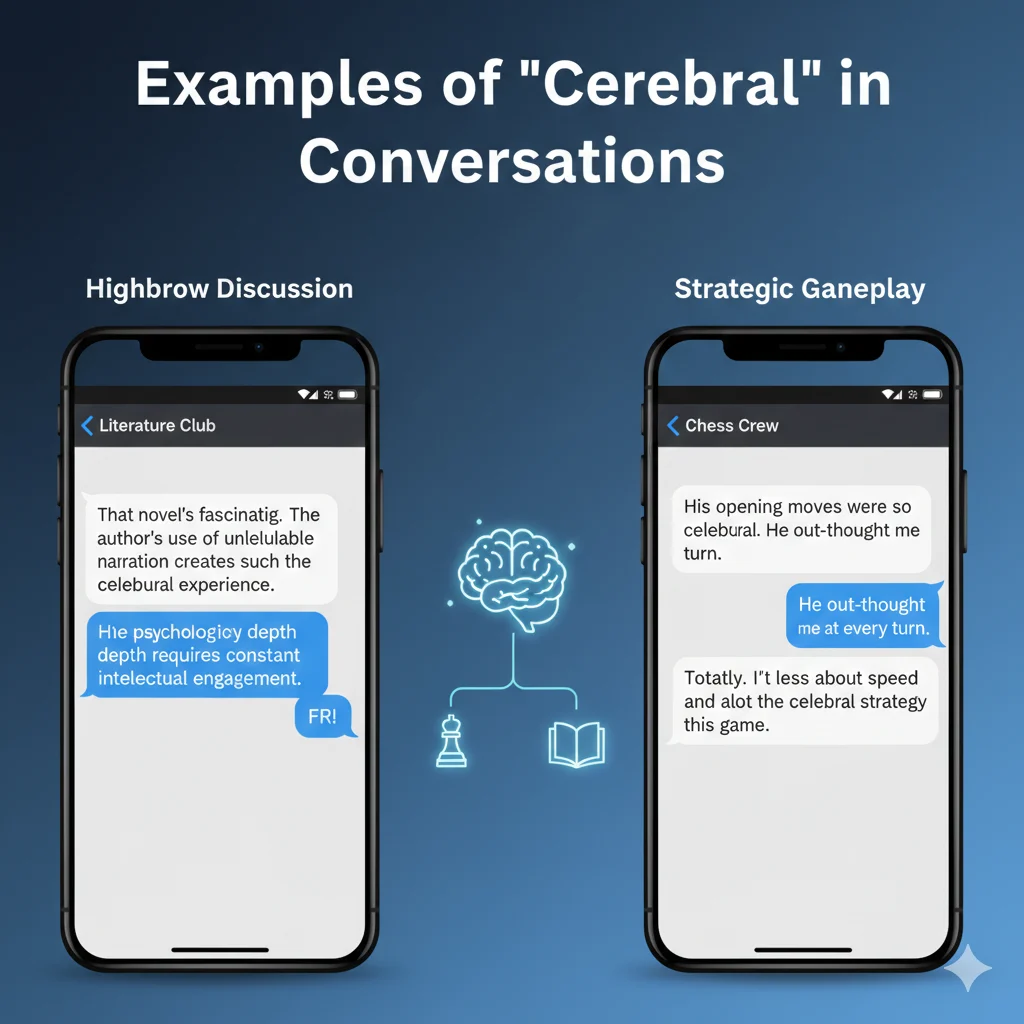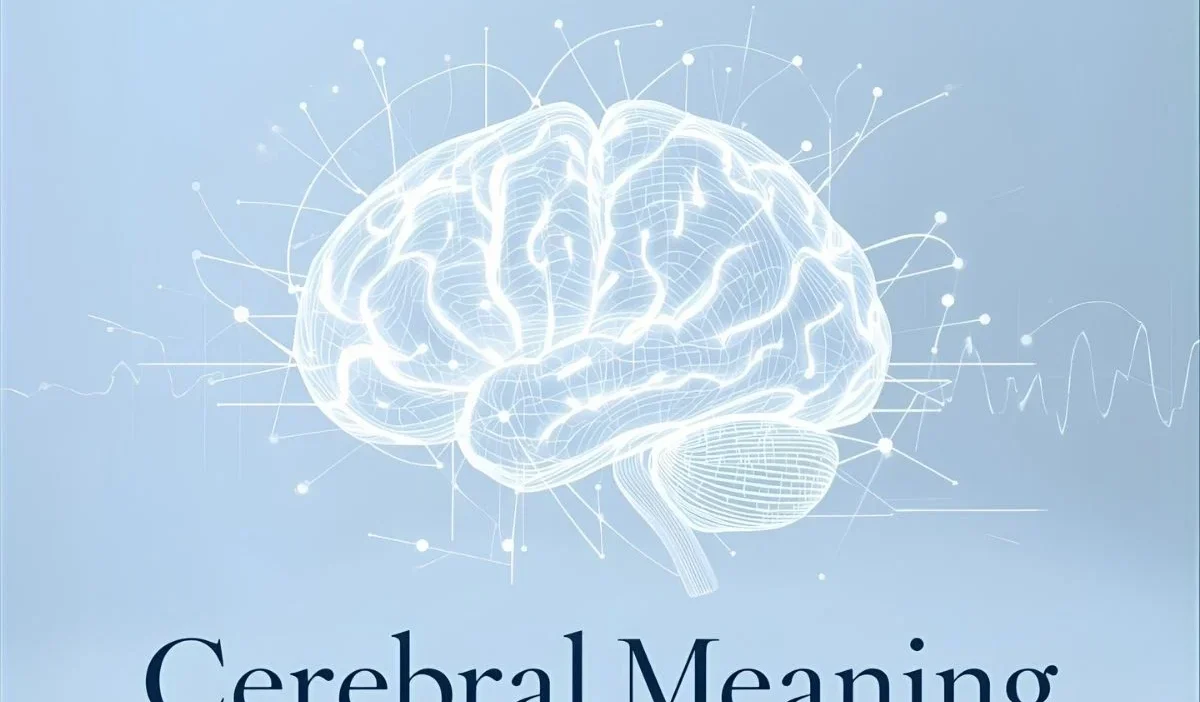Cerebral means related to the brain or intellect, often describing something that is intellectual, analytical, or mentally focused rather than emotional.
Cerebral Definition
The word cerebral is commonly used in education, psychology, art, and everyday language, which is why people search for its meaning. It describes ideas, activities, or personalities that emphasize thinking, reasoning, and intellectual dept
. A cerebral person tends to enjoy analysis, logic, and complex thought, while a cerebral movie or book focuses more on ideas and mental engagement than action or emotion.
Understanding the meaning of cerebral helps readers interpret descriptions accurately and express intellectual qualities clearly. Using the term correctly allows you to highlight mental depth, thoughtful behavior, and intellectual stimulation in both personal and professional contexts.
What Does Cerebral Mean?
Cerebral means related to the brain or intellect rather than emotions.
It describes something intelligent, thoughtful, or analytical. In everyday language, calling something “cerebral” means it appeals to the mind — not the heart.
Example:
“Christopher Nolan’s movies are often called cerebral because they challenge the audience to think deeply.”
Type: Adjective
Commonly used in: Literature, film reviews, psychology, and academic discussions.
Origin and Popularity
The word “cerebral” originates from the Latin word “cerebrum,” meaning “brain.” It first appeared in English during the early 19th century, used in medical and anatomical contexts to describe anything relating to the brain.
Over time, the term evolved beyond medicine. By the mid-1900s, it started being used metaphorically to describe intellectual or thoughtful people, art, or activities.
Quick Timeline
| Era | Usage |
|---|---|
| Early 1800s | Used medically to describe parts of the brain. |
| 1900s | Adopted in psychology and philosophy. |
| Late 1900s | Commonly used to describe intelligent films, books, or personalities. |
| 2000s onward | Popular in pop culture, reviews, and personality descriptions. |
Cerebral Meaning in Different Contexts
The meaning of “cerebral” can slightly change depending on where and how it’s used. Here’s how it appears across various contexts:
🧠 In Science or Medicine
Meaning: Directly related to the brain or nervous system.
Example: “A cerebral hemorrhage is bleeding within the brain.”
💬 In Everyday Speech
Meaning: Describes someone who thinks deeply or values intellect over emotion.
Example: “He’s a very cerebral person — always analyzing everything.”
Cerebral Movie Meaning
A cerebral movie is a film that focuses on thinking, ideas, and mental engagement rather than just action or visuals. These movies challenge the viewer’s mind with deep themes, complex plots, symbolism, or philosophical questions. Cerebral films often require attention and interpretation, making you think even after the movie ends.
They may explore topics like human psychology, reality, time, morality, or identity. Instead of easy entertainment, cerebral movies aim to stimulate the brain and encourage discussion.
In short: a cerebral movie is intelligent, thought-provoking, and mentally engaging rather than purely entertaining.
🎬 In Art, Movies, or Literature
Meaning: Something that stimulates thought or requires reflection rather than action.
Example: “Inception is a cerebral movie — you need to watch it twice to understand it.”

🏢 In Business or Communication
Meaning: Analytical and strategic thinking over impulsive decision-making.
Example: “Her cerebral approach to problem-solving helped the company innovate.”
Cerebral Person Meaning
A cerebral person is someone who is highly intellectual and enjoys thinking deeply. They focus more on ideas, logic, and analysis than on emotions or physical activities. Cerebral people like discussing complex topics, solving problems, and exploring knowledge.
They are often thoughtful, reflective, and curious, preferring mental stimulation such as reading, debates, or puzzles.
In short: a cerebral person is intelligent, analytical, and mentally driven rather than emotionally or physically oriented.
🧩 Comparison Table: Cerebral in Science vs. Culture
| Aspect | Scientific / Medical Context | Cultural / Everyday Context |
|---|---|---|
| Core Meaning | Relating to the brain’s physical structure or functions. | Describing something intellectually stimulating or thoughtful. |
| Example Sentence | “The patient suffered a cerebral injury affecting coordination.” | “It’s a cerebral movie that makes you reflect on life.” |
| Field of Use | Medicine, neuroscience, anatomy. | Art, film, literature, general conversation. |
| Tone | Technical and factual. | Descriptive and metaphorical. |
| Audience | Doctors, scientists, medical students. | General public, critics, thinkers, writers. |
| Associated Words | Cerebral cortex, cerebral artery, cerebral palsy. | Intellectual, reflective, analytical, brainy. |
Examples of “Cerebral” in Conversations
Here are a few realistic examples showing how “cerebral” is used in different settings:

Example 1 – Everyday Conversation
Friend 1: “What did you think of that documentary?”
Friend 2: “It was a bit too cerebral for me — I prefer something more emotional.”
Example 2 – In a Workplace Setting
Manager: “I like your cerebral approach to this marketing strategy. It’s data-driven and creative.”
Example 3 – In a Review
“The film takes a cerebral look at human relationships, focusing on psychology rather than action.”
Example 4 – Medical Context
“The patient showed signs of a cerebral disorder affecting motor function.”
Similar or Related Terms
| Term | Meaning | Usage Example |
|---|---|---|
| Intellectual | Involving reasoning or intelligence. | “She’s an intellectual thinker.” |
| Analytical | Logical and systematic in approach. | “He gave an analytical breakdown of the data.” |
| Brainy | Informal way to say very smart. | “That kid is really brainy.” |
| Reflective | Deeply thoughtful. | “It’s a reflective novel about identity.” |
| Academic | Focused on scholarly learning. | “He has an academic interest in neuroscience.” |
These terms are often used interchangeably with “cerebral,” but “cerebral” carries a unique tone — more about intellectual stimulation than just intelligence.
How to Use “Cerebral” Correctly
To make sure you’re using the word naturally and correctly, follow these quick tips:
✅ Do’s:
- Use it to describe people, ideas, or works that appeal to logic and intellect.
- Pair it with artistic or academic topics (e.g., “a cerebral novel,” “a cerebral debate”).
❌ Don’ts:
- Avoid using it for emotional or physical actions (e.g., “a cerebral fight scene” doesn’t make sense).
- Don’t confuse it with “cerebellar,” which refers to another part of the brain in medical terms.
Correct Example: “Her essays are cerebral and deeply philosophical.”
Incorrect Example: “That dance was cerebral.” (Dance is physical, not intellectual.)
Common Mistakes or Misinterpretations
Here are some misunderstandings people often have about the term “cerebral”:
- Confusing medical and metaphorical meanings:
In medical terms, “cerebral” literally means “related to the brain,” while in common language, it refers to intellect or thoughtfulness. - Using it as a synonym for “complicated”:
While “cerebral” things can be complex, it doesn’t mean confusing — it means intellectually stimulating. - Assuming it’s negative:
“Cerebral” is neutral or even positive — it praises depth and intelligence.
FAQ Section
What does “cerebral” mean in simple terms?
It means “intelligent, thoughtful, or related to the brain.” Something cerebral appeals to your mind, not your emotions.
Is “cerebral” a compliment?
Yes, usually. Calling someone “cerebral” means they’re intelligent or have deep thinking abilities.
What’s the difference between “cerebral” and “intellectual”?
They’re similar, but “cerebral” emphasizes mental effort and analysis, while “intellectual” refers more to academic knowledge or reasoning.
Can I use “cerebral” to describe a movie or book?
Absolutely. It fits perfectly for works that make you think deeply, like psychological thrillers or philosophical novels.
Is “cerebral” formal or informal?
It’s a formal word, commonly used in writing, reviews, or educated discussions rather than casual conversation.
What is a “cerebral person”?
A cerebral person is someone who values logic, learning, and reflection more than emotions or impulsive actions.
Conclusion
Now that you understand what “cerebral” means, you can use it with confidence. It’s a word that highlights intelligence, depth, and thoughtful reflection — whether you’re describing a person, a film, or a concept.
So next time you hear someone call a movie cerebral, you’ll know they mean it’s one that challenges your mind, not just entertains your eyes.
Keep exploring our site to learn more about fascinating English terms, meanings, and expressions!




